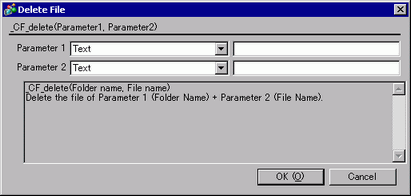The file name can also be specified indirectly using internal addresses.

Summary
Deletes the specified file from the CF Card. Parameter 1 indicates the CF Card data folder. Parameter 2 indicates the name of the file to be deleted.
Format
_CF_delete/_USB_delete (Folder name, File name)
The file name can also be specified indirectly using internal addresses.

Parameter 1
Folder name: Fixed string (Maximum length is 32 single-byte characters)
Parameter 2
File name: Fixed string (Maximum length is 32 single-byte characters), Internal Device (Maximum length is 14 single-byte characters), Internal Device designated with offset (Internal Device + Temporary address, Maximum length is 14 single-byte characters)
Example expression:
_CF_delete ("\DATA", "DATA0001.BIN")
In the above example, "\DATA\DATA0001.BIN" file is deleted.
![]()
Only the 8.3 format (a maximum of 12 characters, with 8 characters for the file name, the period, and 3 characters for the extension) can be used for the file name. You cannot use file names longer than 12 characters.
Maximum length of parameter 1 folder name is 32 single-byte characters.
The folder name can be appended to the parameter 2 file name. Maximum length of parameter 2 folder name + file name is 32 single-byte characters.
For example, \DATA\01\DATA.bin
An Internal Device can be specified for the second parameter (File name). Specifying Internal Device allows indirect addressing of a file name. Also, when using internal devices the maximum folder name + file name length is 14 single-byte characters.
In this example, a file name is stored in LS0100 through LS0106 as follows.
When the above script is run, "\DATA\DATA0001.BIN" file is deleted.
To specify a root folder, specify " " (empty string) as the folder name.
When the LS Area is specified for "File name", "Write-To Addresses" are not counted as D-Script Addresses.
To specify a full path for a file name, specify "*" (asterisk) as the folder name.